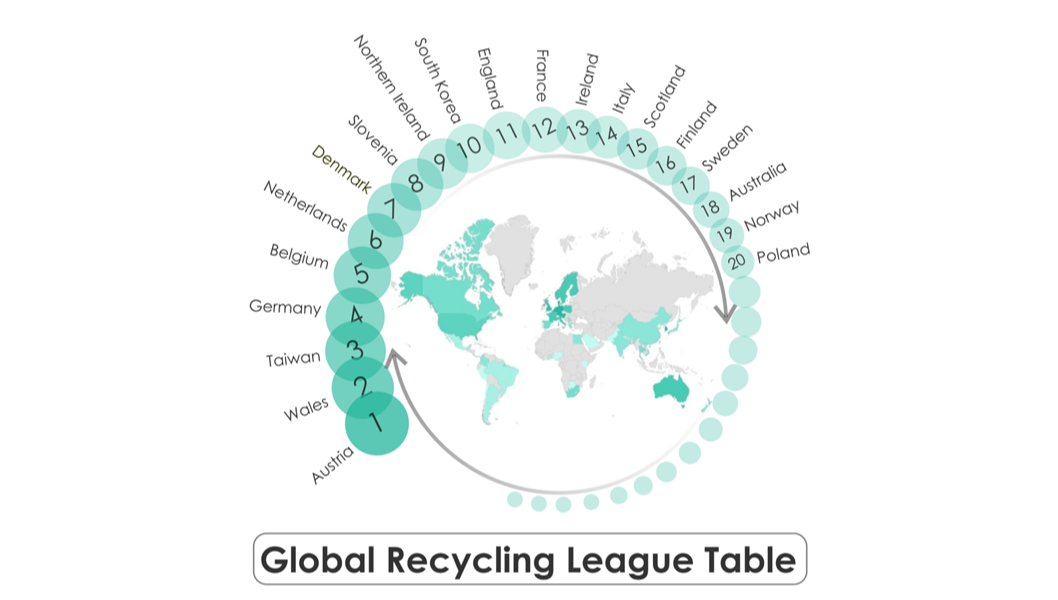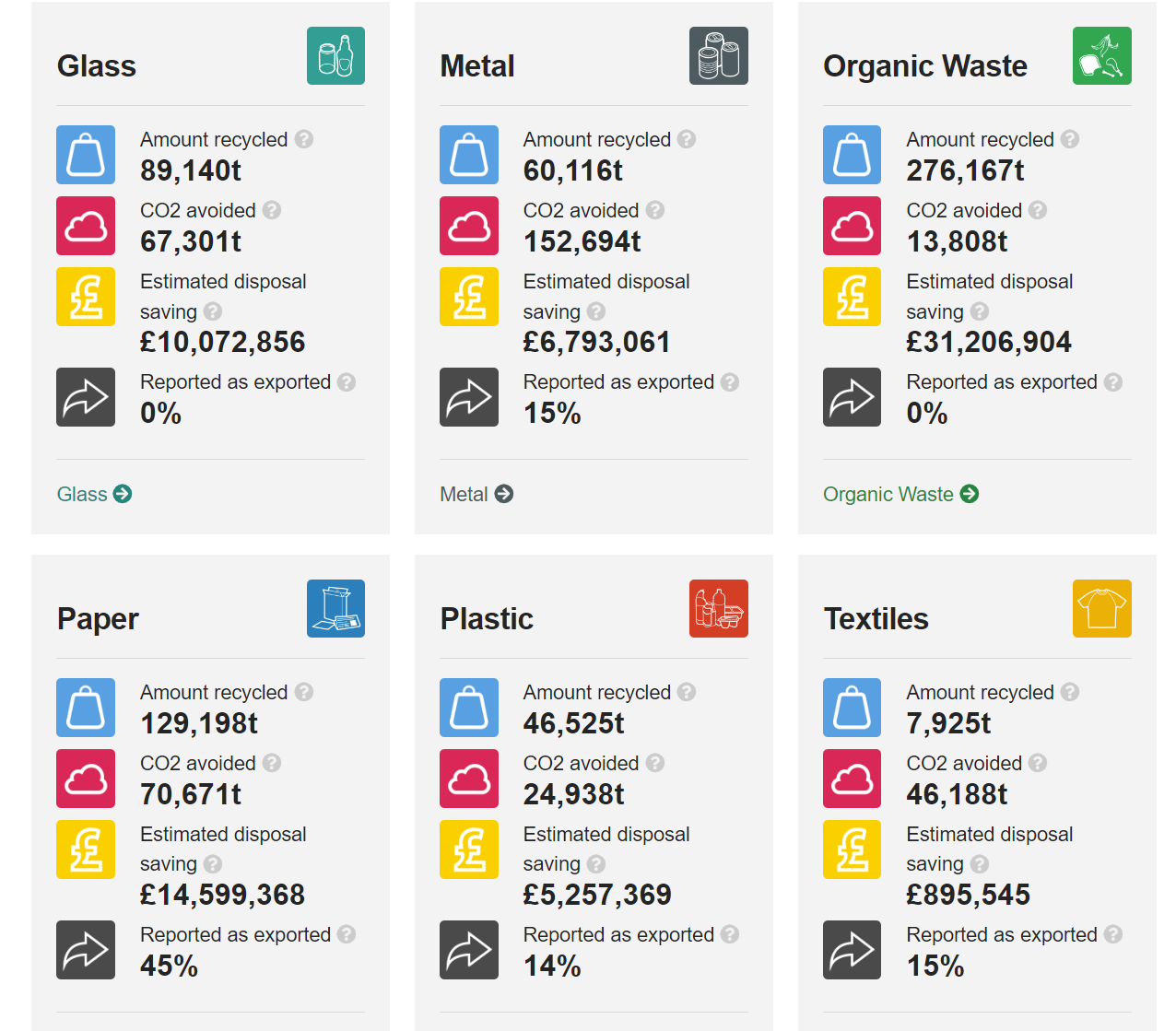IT BEGAN WITH A CAN…
Wales has already shown that change, and in particular behaviour change, is possible; and the experience of achieving it in one area can provide lessons for change in other areas.
In 2004 Wales recycled just 17% of our waste. 20 years later we are 2nd in the global league table for recycling rates.

Wales now recycles 58.6% of our waste*, just a whisker behind Austria (on 59%) in the global league table (Australia is ranked 18th on 38%).
At a household level families now routinely collect all their food waste for weekly collection, alongside all plastic, cardboard, paper and glass - which in most local authorities are required to be sorted separately into collection bags on the curbside.
And weekly waste collections, what we refer to as ‘black bags’, have been replaced by either fortnightly or three weekly collections with a limit to the number of bags a house can put out (and some local authorities are now considering moving to monthly collections of recyclable waste).
A significant change in behaviour, which has been introduced gradually, has become accepted by most people as the ‘normal’ way of doing things.

Recycling benefits by material, 2022/23
This was achieved by setting a vision for Wales to be a ‘Zero Waste nation’ where all waste is reused or recycled. That was underpinned by a long-term strategy with legal targets for municipalities (with financial penalties if the targets were missed); behaviour change initiatives, as well as investment in infrastructure as part of a staged plan for change.
Alongside the plan to cut pollution from waste is a complementary strategy to harness the economic value of waste as a resource. We are developing a Circular Economy to use the materials diverted from landfill or energy recovery to instead manufacture new products. This will drive innovation as well as develop new skills to re-use and repair materials.
We want to increase the quantity and quality of recycled materials that are available to be used by Welsh manufacturers, and are now extending our approach to domestic recycling to commercial waste. Over 70% of the materials in commercial waste could be recycled, and since April 2024 we have made it law that workplaces (from offices to schools to restaurants) need to separate recyclable materials in the way most of us are already doing at home.
This push / pull approach, with both incentives and disincentives for change, applied in a staged way with a focus on changing behaviour has worked in reducing waste and has many transferable lessons for other policy areas.
Put simply, we made it easier to do the right thing, and harder to do the wrong thing.
We made it easier to recycle, by investing in infrastructure and increasing collections of different types of materials, whilst also discouraging general waste by reducing the frequency of collections.
And that has created new habits, and gradually this has built new patterns of behaviour so that recycling is now the normal thing to do, and throwing things away that could be useful is increasingly socially unacceptable.
Progress in recycling shows that with a strategy, a plan, investment in the things needed to make change possible, along with incentives and disincentives does work.
In 2004 Wales recycled just 17% of our waste. 20 years later we are 2nd in the global league table for recycling rates.
Wales now recycles 58.6% of our waste*, just a whisker behind Austria (on 59%) in the global league table (Australia is ranked 18th on 38%).
At a household level families now routinely collect all their food waste for weekly collection, alongside all plastic, cardboard, paper and glass - which in most local authorities are required to be sorted separately into collection bags on the curbside.
And weekly waste collections, what we refer to as ‘black bags’, have been replaced by either fortnightly or three weekly collections with a limit to the number of bags a house can put out (and some local authorities are now considering moving to monthly collections of recyclable waste).
A significant change in behaviour, which has been introduced gradually, has become accepted by most people as the ‘normal’ way of doing things.
Recycling benefits by material, 2022/23
This was achieved by setting a vision for Wales to be a ‘Zero Waste nation’ where all waste is reused or recycled. That was underpinned by a long-term strategy with legal targets for municipalities (with financial penalties if the targets were missed); behaviour change initiatives, as well as investment in infrastructure as part of a staged plan for change.
Alongside the plan to cut pollution from waste is a complementary strategy to harness the economic value of waste as a resource. We are developing a Circular Economy to use the materials diverted from landfill or energy recovery to instead manufacture new products. This will drive innovation as well as develop new skills to re-use and repair materials.
We want to increase the quantity and quality of recycled materials that are available to be used by Welsh manufacturers, and are now extending our approach to domestic recycling to commercial waste. Over 70% of the materials in commercial waste could be recycled, and since April 2024 we have made it law that workplaces (from offices to schools to restaurants) need to separate recyclable materials in the way most of us are already doing at home.
This push / pull approach, with both incentives and disincentives for change, applied in a staged way with a focus on changing behaviour has worked in reducing waste and has many transferable lessons for other policy areas.
Put simply, we made it easier to do the right thing, and harder to do the wrong thing.
We made it easier to recycle, by investing in infrastructure and increasing collections of different types of materials, whilst also discouraging general waste by reducing the frequency of collections.
And that has created new habits, and gradually this has built new patterns of behaviour so that recycling is now the normal thing to do, and throwing things away that could be useful is increasingly socially unacceptable.
Progress in recycling shows that with a strategy, a plan, investment in the things needed to make change possible, along with incentives and disincentives does work.
And if it can work in waste, perhaps it can work in other areas too...
* The figure of 58.6% was determined by Eunomia in order to get better parity in the comparisons they made. The Welsh Government’s own published stats for local authority collected municipal waste is 65% because it includes items such as rubble and street sweepings which were not included in Eunomia's analysis.



Comments